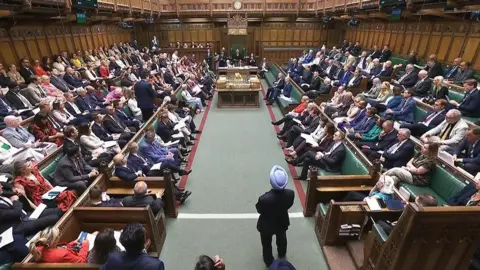The recent progress of the Terminally Ill Adults (End of Life) Bill, which proposes to legalize assisted dying under specific circumstances in England and Wales, has marked a significant moment in the legislative process. On 20 June 2025, the House of Commons witnessed pivotal developments as Members of Parliament (MPs) voted in favor of the bill by a notable majority of 23, following a previous approving vote where the bill won by 55 votes back in November. While proponents of the legislation express optimism, it is essential to clarify that the bill has not yet become law and still faces multiple hurdles.
Upon passing in the Commons, the bill is set to undergo a similar procedural journey through the House of Lords. Just as it faced rigorous discussions in the Commons, supporters anticipate a similar level of scrutiny and debate in the Lords, where members have the opportunity to propose amendments and alterations. Ultimately, MPs will have the final word on any changes put forth by the Lords, a crucial step before the legislation can be enacted. The bill’s journey could still face roadblocks, including a lack of parliamentary time or potential opposition from peers who may seek to delay or block the initiative entirely.
A key component of the legislative process moving forward revolves around the expectations of the Lords. Peers are granted a free vote, enabling them to act according to their conscience rather than strict party lines. Initial assessments indicate that a majority of peers may support the bill, but until the actual votes are cast, this remains speculative. Importantly, a diverse range of viewpoints among the peers will influence the outcome; experts across various fields, including law, medicine, and disability rights, will contribute to the discourse, advocating both for and against the proposed legislation.
One critical aspect of the bill’s future involves the possibility of it being blocked altogether by the Lords. Typically, the Upper House refrains from obstructing government bills; however, this legislation is categorized as a private members’ bill, sponsored by Labour MP Kim Leadbeater, with the government maintaining a neutral position. The bill’s progress will largely depend on whether peers choose to respect the Commons’ majority decision or pursue further amendments that might create contention. Prominent figures, like Lord Falconer—a long-standing advocate for assisted dying—express hope that peers will honor the Commons’ endorsement of the bill.
Another pressing concern for supporters is the potential for the bill to run out of parliamentary time. Parliamentary sessions differ in length, with most spanning approximately one year, and private members’ bills do not have the option to be carried over into subsequent sessions. The Terminally Ill Adults (End of Life) Bill has navigated nearly seven months in the Commons, and there is unease about whether it can achieve similar progress in the Lords while adhering to the session timeline. Should the bill falter too long, proponents fear it could “fall” before reaching a conclusion.
Moreover, the dynamics of disagreement within the House of Lords may exacerbate delays. Peers opposed to the bill might introduce numerous amendments, complicating the passage. In the Commons, MPs can expedite the voting process through closure motions, but such mechanisms do not exist in the Lords. This could lead to prolonged negotiations between the two Houses, potentially culminating in a back-and-forth known as “ping pong,” wherein the bill’s approval becomes more elusive.
While current projections suggest that implementation of assisted deaths may not begin until late 2029 due to necessary provisions outlined in the bill, some stakeholders hope a quicker implementation is possible. The proposed changes, including the modification of responsibilities from a high court judge to an expert panel, have extended the expected timeline. The upcoming discussions in the Lords will be crucial in determining how swiftly the bill can advance towards becoming law, noting that efficient cooperation between both Houses is essential for timely progress.
The successful enactment of the Terminally Ill Adults (End of Life) Bill remains contingent on various political and procedural elements. As the debate unfolds in both houses, the outcome may significantly influence societal approaches to assisted dying in the UK, reflecting broader discussions about autonomy, medical ethics, and compassionate care at the end of life.











